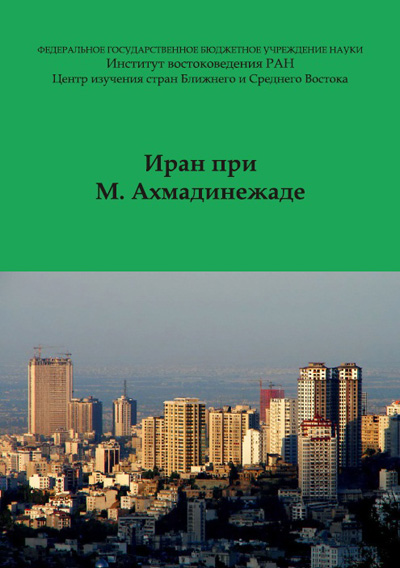Книга
 Иран при М. Ахмадинежаде. Памяти А.З. Арабаджяна
Иран при М. Ахмадинежаде. Памяти А.З. Арабаджяна

Ответственный редактор: Мамедова Нина Михайловна
Составитель: Дунаева Елена Викторовна
Москва, 2013, 220 стр.
В сборнике анализируются внутриполитические проблемы современно-го Ирана, экономическая и культурная политика руководства страны, отдельные аспекты его социального развития. Исследуются основные тенденции внешнеполитического курса ИРИ, прежде всего, на америка-но-иранском направлении и в связи с «арабской весной», а также в оценках турецких экспертов. Отдельное освещение получили проблемы двусторонних отношений Ирана с РФ, Пакистаном и Центральноазиат-ским регионом. Ученые Института востоковедения РАН обсудили все эти проблемы за чрезвычайно противоречивый и сложный период с 2005 г. по 2012 г. на конференции 2012 г. Доклады представленные на этой конференции, опубликованы в данной книге. Коллектив авторов подготовил этот сборник к 90-летию со дня рождения А.З. Арабаджяна – известного российского (и советского) ираниста, долгие годы возглав-лявшего сектор Ирана Института востоковедения РАН. Следует отме-тить, что точка зрения авторов не всегда совпадает с мнением редакто-ра.
English version
M. Ahmadinejad got a convincing victory at 2009 elections advancing a slogan of “Justice”. “Justice” had relation not only to internal social and economic policy but to foreign policy as well. During M. Ahmadinejad’s presidency the foreign policy of Iran was governed not only by “civilizational component” but also by antagonism against unipolar world order. As a result both home and foreign policy of Tehran were targeted at consolidating its potential which was the basis of national development, of increasing its influence in the region and of finding ideological, economic and political partners. Internal stability, economic potential and the dynamic of economic development improved the regional and global status of IRI. The second term of M. Ahmadinejad coincided with the world economic crisis, which aggravated socio-economic problems and caused the rise of grass roots opposition movement in the most problematic countries. These developments created new challenges to relations of IRI with Middle East countries. Scholars of the Institute of Oriental Studies discussed different issues concerning political, economic and cultural life of Iran during the extremely contradictory and complicated period of 2005 – 2012 at a conference held in 2012. Papers written by them can be found in this book. This collection of articles sheds light on the situation in Iran and the general issues of its development. The team of authors prepared this publication on the occasion of 90th anniversary of the birth of A.Z. Arabajan. He was a famous Russian (and Soviet) expert in Iranian studies and for many years headed the Iranian Sector of the Institute of Oriental Studies, RAS. It should be mentioned that the authors’ points of view do not necessarily coincide with the opinion of the editor.



